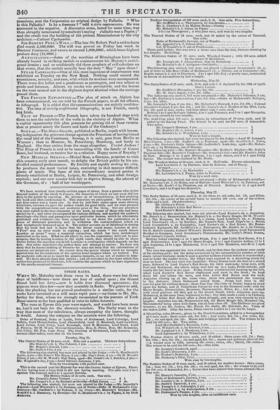We have received four closely-written pages of abuse, from a
person who styles himself author of the Guide to France, the demerits of which we last week did our duty to the public by ex0osing. He accuses us of inconsistency, in first praising his book and then condemning it. This objection we anticipated. We stated that our first notice was a hasty one. In that we laid little stress upon some obvious blemishes, because we gave the author credit for good faith, and we were pleased "with the compendious form and moderate price of the thing. But our attention icvas soon called to the true character of the book, by some of those who had been xeisled by it ; and when we compared the various editions, and marked the author's doublings--the libels and panegyrics upon particular houses, which he alternately published and withheld-we were compelled to set down the publication as a Lof dishonest quackery, and to withdraw the commendation which we bad incautiously bestowed upon it. The author accuses us of falsehood in stating that his book bad laid it down that the Dover coach leaves London at five. 1' Five" was an error made in copying ; and the words " the coach leaves London at seven" were a marginal correction, which has been mistakingly embodied in the text. What we did object to, was the expectation held out to pas- sengers, that by leaving London in the night coach, they should be able to leave Dover before the morning coach left London-a contingency which depends on the tide. Our other objections the author does not attempt to answer. He does not deny that he knows nothing of French-he does not deny that his calculations of expense are delusively low. Ile cannot deny the graver charge which we brought +against him for his treatment of the various liotel.keepers whom we noticed. Yet be modestly calls onus to insert his abusive remarks, as an act of justice to him- self. We have already done him justice; • and all travellers by the route which this author has professed to illustrate, will confirm the opinion which we have expressed of his merits moral and literary.


























 Previous page
Previous page